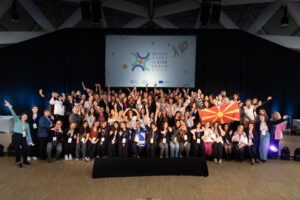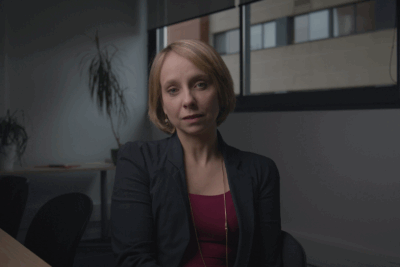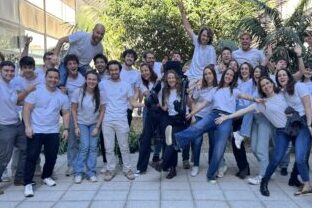23rd October 2024
At the recent Women and Girls in STEM Forum in Budapest, OnHerCare, a health-related solution from a team comprising Sophie (Italy) and Ikran (Finland), was announced as the winner of this year’s Girls Go Circular 2024 Student Challenge.
Reducing the digital gender divide and increasing women’s participation in digital technology is crucial for Europe’s economic growth, promising a potential surge of 16 billion euros annually.[1]
To unlock the potential of women in digital sectors, the European Institute of Innovation and Technology and its Knowledge and Innovation Communities (KICs) created the Girls Go Circular programme. The initiative equips girls aged 14-19 across Europe with digital and entrepreneurial skills through an online learning platform on the circular economy, and has, to date, trained over 40,000 schoolgirls.
Recognising that the gender gap in STEM is adding to the known talent shortage in healthcare, EIT Health has introduced specific health modules aligned with EIT’s Deep Tech Talent Initiative pledge to have one million people skilled in deep tech by 2025. This is the third year that EIT Health has supported the Girls Go Circular programme.
Both Girls Go Circular and the Deep Tech Talent Initiative are part of the EIT Community Education actions; programmes in which KICs come together to create cross-cutting opportunities, foster peer learning, and equip learners to innovate solutions to global challenges tackled by European policies, most notably the Green Deal, the New European Innovation Agenda, and efforts to eliminate the gender skills gap.
Girls Go Circular Student Challenge 2024: AI for Gender Equality
A total of 234 girls from 24 European countries participated in this year’s challenge and were invited to explore the world of AI and its potential to solve real-life societal challenges. The aim was to equip students with essential AI knowledge, boost their creative and problem-solving skills, and empower them to enact positive change.
Participants were tasked to work in teams and develop an AI tool to help reduce gender inequalities in an area of their choice, such as health, education, employment, sciences, arts, sports. After showcasing their idea in a design thinking slide deck and three-minute pitch video, one team from each project country was selected, and from those, the best three teams were invited to pitch their idea on stage at the Women and Girls in STEM Forum in front of an expert jury.

OnHerCare
Sophie and Ikran’s outstanding presentation of their solution, OnHerCare, an AI tool to fight gender bias in healthcare, and their mission to make healthcare more equitable and inclusive for women everywhere, led them to win this year’s challenge.
OnHerCare aims to tackle gender disparities in healthcare, where women often face misdiagnosis and under-treatment. By leveraging AI, the tool detects biases in health data, predicts health issues accurately, and provides tailored treatment insights, improving health outcomes for women.
The diagnostic algorithms are continuously updated with the latest medical research to enhance accuracy and relevance and improve patient outcomes. OnHerCare also prioritises transparency, privacy, and ethics to build trust and reliability among users and healthcare providers.
Ikran said: “We want to decrease the gap of misdiagnosis, so women can feel comfortable, safe, and represented in the healthcare system.”

To further inspire their innovation journey, as their prize, Sophie and Ikran will go on an all-inclusive trip to Berlin, Germany, to attend the Potsdam Uni Hackathon on 8-9 November. They will take a tour of Studio Babelsberg, visit seven universities on campus and explore exciting education opportunities in the area while taking part in an international hackathon with like-minded students.
Audience Choice Award
Following an online public vote, another health-related solution, Equalife, submitted by the team from Serbia, comprising students Teodora, Staša and Majda, was declared the winner of the Audience Choice Award for its health solution.
Equalife aims to prevent the misdiagnosis of women by using AI to analyse a comprehensive range of symptoms, accounting for gender differences. This approach improves the likelihood of early and accurate detection, thereby enhancing healthcare outcomes for women and reducing the biases that lead to misdiagnosis.

Equalife won $6,000 AWS Cloud Credits generously sponsored by EIT Health’s WorkinHealth Foundation as part of their partnership with AWS (Amazon Web Services). AWS offers services like computing power, machine learning, and development tools. The Equalife students will get to use their AWS credits to enhance their coding, machine learning, and app development skills or start a tech business, gaining hands-on experience with advanced cloud technologies.
Learn more about the Girls Go Circular programme and its impact by watching our Spotlight film.
[1] Increased women’s, girls’ participation in digital technology crucial to economies, global sustainability, Speakers Tell Commission, as session continues | meetings coverage and press releases (no date) United Nations. Available at: https://press.un.org/en/2023/wom2224.doc.htm (Accessed: 18 October 2024).
EIT Health and the EDIT-B consortium transform bipolar disorder diagnosis with groundbreaking blood test

Discover this life-changing project today.
Three EIT Health innovators nominated for EIT Awards

Meet our three EIT Award nominees.
Hospital Clínic study reinforces patient participation as key to digital health innovation

New work published in Journal of Medical Internet Research.